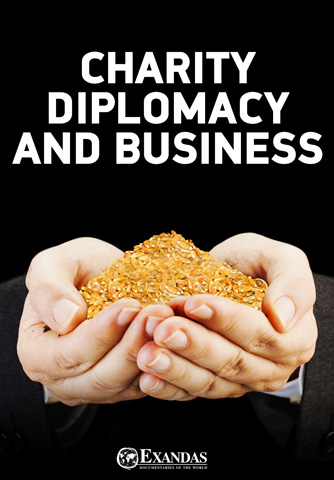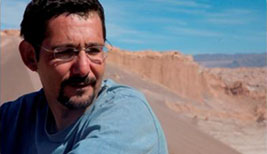
Charity, Diplomacy and Business
Dir: Yorgos AvgeropoulosIn July 2011, a great wave of famine ravages the Horn of Africa. Over 13 million people are threatened with starvation. Somalia, Kenya and Ethiopia are in the center of a terrible humanitarian crisis and the United Nations plead with the international community for immediate food aid for the affected regions.
Once again, starvation spreads death through Africa. For decades now, our screens are being inundated with images of emaciated Africans and always, the so called developed countries are sending help. But, what is done incorrectly and the Black Continent is still starving? “Charity, Diplomacy and Business” is filmed on location in Kenya and the United States, the two ends of this humanitarian thread, and it investigates into the not so altruistic aspects of a system that traps the poor states of Africa in a vicious circle of dependency and hunger.
Watch the Film Now!
Choose the language you prefer and stream the film in Full HD from any digital device. Enjoy your private screening!
Buy the DVD
Public Screening
Are you interested in organizing a public screening of our film? Send us an email with your inquiry and we will be glad to assist you!
Educational / Library Use
Are you interested in enriching the library of your institution with our film? Contact us and let's create together an informed public!
- DURATION: 54min
- AVAILABLE IN THE FOLLOWING LANGUAGES: English | Greek
- AVAILABLE VERSIONS: English (54min) | Greek (54min)
- YEAR OF PRODUCTION: 2011
- Written & Directed by: Yorgos Avgeropoulos
- Producer: Georgia Anagnou
- Production Manager: Anastasia Skoubri
- Director of Photography: Yiannis Avgeropoulos
- Additional Research: Andreas Vagias
- Editing: Yiannis Biliris, Anna Prokou
- Original Music: Yiannis Paxevanis
PRODUCTION NOTES
Turkana, an arid and isolated region in northwestern Kenya, was in the center of this recent wave of famine. Here, lives one of the country’s most traditional tribes named after the region it inhabits. The Turkana are nomadic pastoralists. For centuries, they have learned how to survive in this unwelcoming region, dependent on the rain periods.
But the ongoing droughts of the recent years, now threaten their very own existence. Their animals are dying of hunger and thirst and no matter how hard they work the land, it cannot produce anything without any water. The last drought period that affected the Horn of Africa is regarded as the worst in the last 60 years.
“I had two goats, two not five, and they died. And they were so weak that they couldn’t feed us, not even when they died”, narrates Esekon Lokoyen. “I also had a small field, but it didn’t matter, because what we planted was burnt by the sun before it could grow.” The Turkana lost every means they had to ensure their survival. Even the wild fruit, which could offer some sustenance, had now become extremely rare.
“Due to the consecutive drought periods, the rates of malnutrition have really skyrocketed. While the highest international rate lies at 15%, in some regions of Turkana, it reached over 37%”, notes Rose Ogola, the World Food Programme – WFP’s representative in Kenya.
A CHRONICLE OF DEATHS FORETOLD
Approximately 100.000 thousand people lost their lives during the famine in Somalia, Kenya and Ethiopia. 29.000 were children under the age of 5.
However, this drought had been predicted and lives could have been saved, if the system would function differently. After the biblical famine in Ethiopia in ’84-’85, which left one million victims in its path, the US government created a drought forecasting system to avoid similar tragedies in the future. Already in 2010, this system had warned of what was about to happen.
“We had predicted the droughts and were sending warning signals months before the occurrence. Our weather forecasting systems are so advanced that we know months ahead of the oncoming conditions. We were warning people long before the crisis”, discloses Bettina Luescher, WFP’s spokesperson.
“I lost my sister”, Mrs. Attiengo tells us. “She was old and very weak. She melted away of hunger and thirst. She didn’t speak, slept all day and then she was gone. It was when we were holding our stomachs with scraps of clothing. The food came too late, five months after she was dead.”
In every home there is a similar story to be told, whether it concerns a neighbour or a relative. In every village there are makeshift graves. The Turkana, like so many others in the neighbouring countries, were left to starve. People had to die first, before the international community was aroused.
“Unfortunately, only when children die, does the international community get involved”, says Bettina Luescher. “It is when the news becomes more interesting for the global media that the public responds. A fact extremely helpful in these situations”, explains Mark Bowden, the UN’s Resident Coordinator.
PHILANTHROPY FOR DIPLOMACY
It is not the first time that the Turkana tribe comes in contact with the Whites, representatives of the NGOs and international organisations. The majority of their population suffers from chronic hunger. They have been receiving help for the last 15 years and belong to the 1 billion people, who have no access to their daily nourishment. Although chronic hunger almost never reaches the evening news, it is deadly and every year 50 million people succumb to it.
In order to fight against hunger the international community has reached the solution of providing food to those in need. However, since its birth in 1954 and until nowadays, food aid has never been just a matter of sheer humanitarianism. It is a matter of economic and political correlations with the US playing the leading role. “The reason why everyone focuses on American politics in the case of food aid, is because the US provide every year 50-60% of the global food aid”, explains Chris Barrett, Professor of Agricultural Economics at Cornell University.
It was President Eisenhower, who in 1954 signed the now famous Public Law 480, concerning the supply of food aid overseas. It was a conductive way to dispose of the country’s agricultural surpluses and at the same time serve as a tool for economic and foreign policy. In 1961, President Kennedy acknowledged Public Law 480 as of fundamental importance to the United States and renamed it as “Food for Peace”. In just a few words he defined the whole US political system: “Food is strength, and food is peace, and food is freedom, and food is a helping to people around the world whose good will and friendship we want.”
That is why during the Cold War, large quantities of food were sent to countries favourably disposed towards the US, a tactic which continues even nowadays.
“If we are talking about diplomacy, this is a very specific way to promote your national agenda in another country”, James Shikwati, a Kenyan libertarian economist, notes mockingly. “If, for example, you observe animal training, you will see that they train elephants and chimpanzees by using food, right? They give them a cookie or a treat. The same applies in our case. The next time the Americans tell you “jump”, you will jump. Do you understand what I’m saying?”
THE ECONOMIC BENEFITS OF SUPPLY
Public Law 480 provided that the US were to offer help in kind, with products cultivated on American soil, of which 75% has to be transferred by American shipping companies. So, apart from the US’s foreign affairs, the country’s internal affairs, namely the American food production and shipping companies, also benefited greatly from this arrangement.
“And this means that the shipowner has invested interests in food aid politics”, remarks Chris Barrett. “This is an extremely profitable lobby. The US government is the only one in the world that has essentially done nothing to procure food locally, in order to meet the food demands faster and at a lower cost.”
The US Government Accountability Office, the governmental organisation, which controls where the American taxpayers’ money goes, has pinpointed the problem: “Six months pass by the time the food that had been shipped from the US harbors reaches the people in need”, says Mr. Melito, the organisation’s representative. “From the money spent, only half of it goes to the purchase of food. The rest is given to shipping companies and to the overall transportation.”
DEPENDENT ON HELP
It is a joyful day when the food reaches the starving communities. In Turkana, the organisations’ delegates are greeted by the locals with songs. “I don’t like depending on others for my survival”, Essecon Lokoyen tells us. “We are grateful that other countries care for us. The Kenyan government knows about the problems caused by drought and ignores them. We have told them to install water supply lines for our fields, but it is like talking to deaf ears.”
The government of Kenya has, indeed, abandoned this region. There are no streets, no water or electricity. There is nothing. The government seems to prefer asking for help from foreigners, in order to feed the starved Turkana, instead of investing in infrastructure and development work in the area.
“Rather than going from village to village and gathering 10% of the people’s food production, it is easier to embezzle the food aid sent”, says James Shikwati. “Government officials record famine as a disaster and assign to the political elites the import of food. Thus, it becomes even easier to make money from product imports, at the expense, of course, of the starving population, instead of allowing Kenyans to produce their own food.”
However, Kenya is an agricultural country and farming is the backbone of its economy. In fact, before the ’80’s, the country not only produced, but also exported products. But at that time, in order to get help with its debts, it was forced by the IMF and the World Bank not only to implement a rigorous fiscal programme, but also to change its agricultural policy.
“This is a clear example of a country forced by international powers to consign over its policy making that ought to have been of strategic importance to its citizens”, notes James Shikwati.
So everything, including education, health, energy and transportation had to follow the free market’s laws. Agricultural policy making was no exception. Governmental support towards farmers was withdrawn, as was the power of strategy making to secure the population’s alimentation.
“These are the politics set for this land. So, if you don’t have enough food for the people, and since you don’t have any money for imports, then you receive food aid”, explains Oduor Ongwen, international economic relations analyst. “But food is a strategic matter. As long as you depend on others to provide you with food, you don’t control the means and the infrastructure of food production and distribution. You cannot claim that you possess sovereignty and independence.”
CEDING THE LAND TO FOREIGNERS
Kenya still has productive lands that remain uncultivated. So, it would only be natural to believe that by exploiting its lands, the country could solve the problem of food provision. However, this is not the case. On the contrary, it is foreign investors, who come to bring “development”.
“We have to get used to it. Like the foreigners, who exploit our natural resources, the same will happen with our land. We have to get used to this”, Dr Romano Kiome, the Ministry of Agriculture’s permanent secretary, accepts resignedly. James Shikwati answers: “This is the culture of dependency that leads the political elite groups to sell and rent these lands to foreigners. It is a lack of faith in the African people.”
In 2002, Calvin Berges, an American, and his family visited the Yala Swamp in Kenya, a marshy but fertile region. “They had money and believed they had to invest it in the farm to help with Africa’s food provisions. So, the investor came here and rented the farm from the local authorities for a period of 25 years”, explains Chris Abir. He is the director of Dominion Farms, which was founded on 17.000 cheaply rented hectares of land by Mr Berges. His company, among other things, builds private prisons in the US, while in Kenya it produces rice, which is mostly packed and shipped to supermarkets.
The inhabitants initially believed that they would have work, development and most of all food. Besides, the investor had approached them through the church to present them with his good intentions. But their expectations were crushed. The company’s expansive tactics banished them from their land, while the dam, which Dominion constructed in order to control the river’s flow for the irrigation of the water-loving rice crops, caused uncontrollable floods in the area.
George Muaron stands in front of his withered corn that was destroyed when the fields were flooded. “I have lost everything, my crops and my animals. I don’t have anything to live from.” Irasto Dittou, another inhabitant, says angrily: “I am sorry to say this, but our government still lives in the colonial era. It resides at its offices in Nairobi and asks for help from the American people. And that is what Dominion takes advantage of and takes over even more lands leaving nothing for the Kenyans.”
Local communities claim to have lost any chance of producing their own food. Soon, they will also need to receive food aid, despite the fact that they are living in a fertile region.
This is how this vicious circle of dependency will continue, condemning more and more Africans to poverty and hunger. Lately, the voices opposing this policy have become stronger. For many years now, James Shikwati, has been emphatically stating that food aid has to be abolished: “In order to help the African people we cannot solely rely on giving some sacks of grain to those starving. We have to question the global food system and how it leads Africans, who live in rural areas, to have no food whatsoever.”







